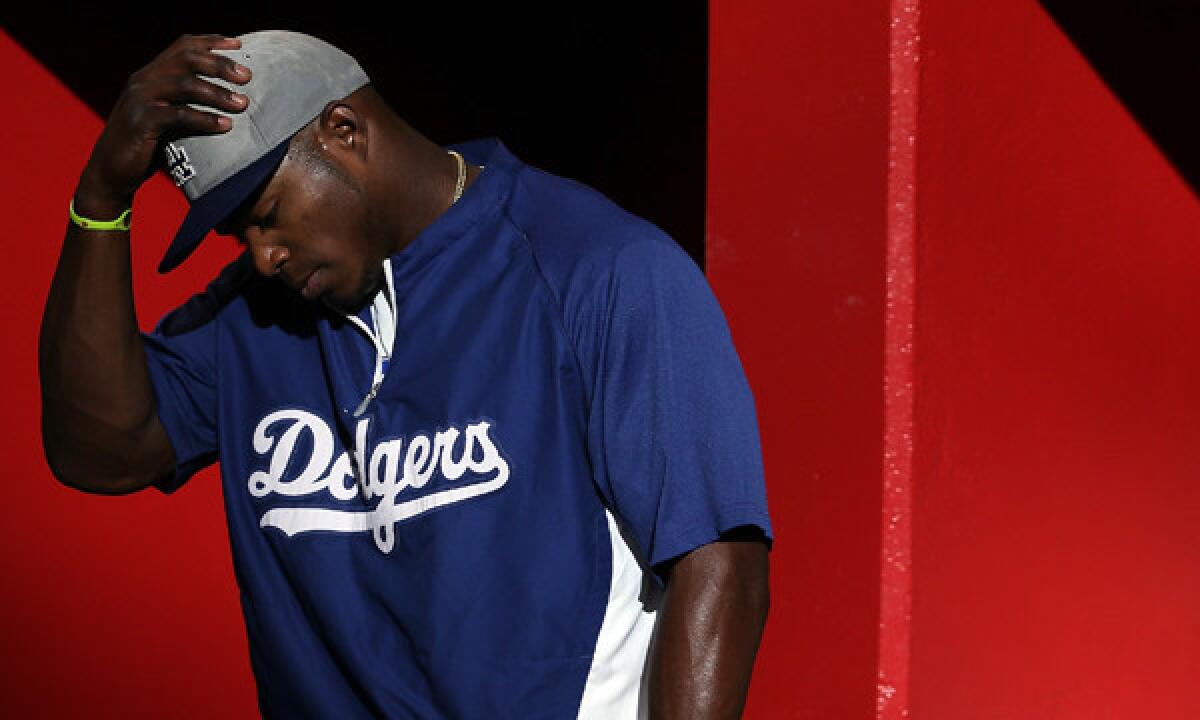Dodgers, MLB mum on article detailing Yasiel Puig’s escape from Cuba

The Dodgers and Major League Baseball declined to comment Monday about a magazine article detailing Yasiel Puig’s dangerous escape from Cuba and the death threats the 23-year-old right fielder received last year from human traffickers under control of a major Mexican drug cartel.
Through a team spokesman, Puig also declined to comment on the story, which is scheduled to run in the May issue of Los Angeles Magazine. Puig has never talked about how he left Cuba.
The Dodgers and MLB wouldn’t say what measures they have taken to ensure the safety of Puig and his teammates, though the club is known to have hired full-time security detail last year. The team and commissioner’s office also wouldn’t speak on what they knew of the circumstances behind Puig’s defection.
Speaking to The Times last year, Dodgers scout Paul Fryer made this cryptic remark about how the team signed Puig to a seven-year, $42-million contract in 2012: “There’s a lot of things I don’t want to get into; how we had to find the real decision-maker.”
The insinuation was that a party other than the Dodgers, Puig and his then-agent, Jaime Torres, was involved in finalizing the deal.
Dan Halem, baseball’s executive vice president for labor relations, declined to speak specifically about Puig. Speaking generally, Halem said the commissioner’s office usually does not become aware of a Cuban defector until the player’s agent contacts the league to initiate the free-agent signing process.
“We almost never hear of how the players got here,” Halem said.
If an issue arises later — Cuban defector and Oakland Athletics outfielder Yoenis Cespedes sparred with Dominican agent Edgar Mercedes over how much Cespedes owed the agent, for instance — the league typically refers the matter to law enforcement.
The league has a robust investigative unit, most notable for work on the Biogenesis scandal that led to the suspensions of 13 players, including Ryan Braun and Alex Rodriguez.
The league has tried to reform the signing process in the Dominican Republic, where many parties can claim to represent a player from a very young age, with mixed results. Such an effort would be impossible in Cuba, largely because the U.S. trade embargo forbids MLB and other U.S. companies from doing business within Cuba.
In the Dominican and other Latin American countries, Halem said, MLB officials conduct background checks, primarily to verify a prospect’s identity and age. However, he said, the league has no access to the Cuban records that would be necessary for similar checks for Cuban-born players.
In the Los Angeles Magazine story, contributing writer Jesse Katz wrote: “Puig’s journey, according to claims made in court documents and detailed in interviews, had been underwritten by a small-time crook in Miami named Raul Pacheco, an air-conditioning repairman and recycler who was on probation for attempted burglary and possession of a fake ID. Pacheco had allegedly agreed to pay the smugglers $250,000 to get Puig out of Cuba; Puig, after signing a contract, would owe 20 percent of his future earnings to Pacheco.”
Halem said what a major league player does with his money is his business. If the league were to become aware of illegal activity — for example, of a Cuban defector forwarding money to Cuba in amounts that might violate U.S. law — MLB would pass that information on to law enforcement.
More to Read
Are you a true-blue fan?
Get our Dodgers Dugout newsletter for insights, news and much more.
You may occasionally receive promotional content from the Los Angeles Times.






